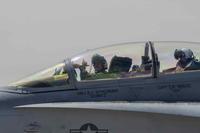 The Air Force released pictures this week of the new guided tail kit installed on the B61-12 nuclear bomb that improves the bomb's accuracy. Along with upgrades that allow the U.S. military to lower the warhead's yield, one analyst said the U.S. is breaking a key nuclear treaty.
The Air Force released pictures this week of the new guided tail kit installed on the B61-12 nuclear bomb that improves the bomb's accuracy. Along with upgrades that allow the U.S. military to lower the warhead's yield, one analyst said the U.S. is breaking a key nuclear treaty.
Carried by U.S. and NATO nuclear-capable bombers and fighter jets, the B61-12 is an upgraded version of the B61, which was designed in 1963. The thermonuclear bomb is guided by an Internal Guidance System and can glide to its target. The B61-12 version has four selectable yields -- 0.3, 5, 10 and 50 kilotons -- according to the Federation of American Scientists.
The U.S. has started an expensive program to upgrade the B61 that Air Force leaders have been spent years requesting from Congress. The upgrades will cost about $10 billion for 400-500 bombs.
Along with stockpiles in the U.S., the Air Force has B61s deployed across Europe in Belgium, Germany, Italy, the Netherlands, and Turkey. The B61-12s will replace the 200 older versions currently in those countries.
At least one nuclear weapons analyst is questioning whether the upgrades to the B61 may be in violation of the 2010 Nuclear Posture Review that states the life extension programs for nuclear munitions can "not support new military missions or provide for new military capabilities."
Hans Kristensen, a fellow with the Federation of American Scientists, said the new tail kit and lower yield capabilities would allow the U.S. military to employ the bomb in new mission sets. In January, Kristensen asked former Air Force Chief of Staff Gen. Norton Schwartz at a Washington D.C. defense conference if the B61-12 upgrade would allow the Air Force to use it against new target sets and offer new capabilities.
“It would have both effects,” Schwartz told Kristensen at the January conference.
Kristensen writes that these upgrade programs could put the Nuclear Posture Review at risk.
"In addition to violating the NPR pledge, enhancing the nuclear capability contradicts U.S. and NATO goals of reducing the role of nuclear weapons and could undermine efforts to persuade Russia to reduce its non-strategic nuclear weapons posture," Kristensen wrote for FAS.
Schwartz was asked by Kristensen at the conference whether he thought the upgrades to the B61 would increase the likelihood the U.S. would use the nuclear bomb. Kristensen said Schwartz told him the opposite was true. In fact, the upgrades would improve the bombs deterrence capabilities.








